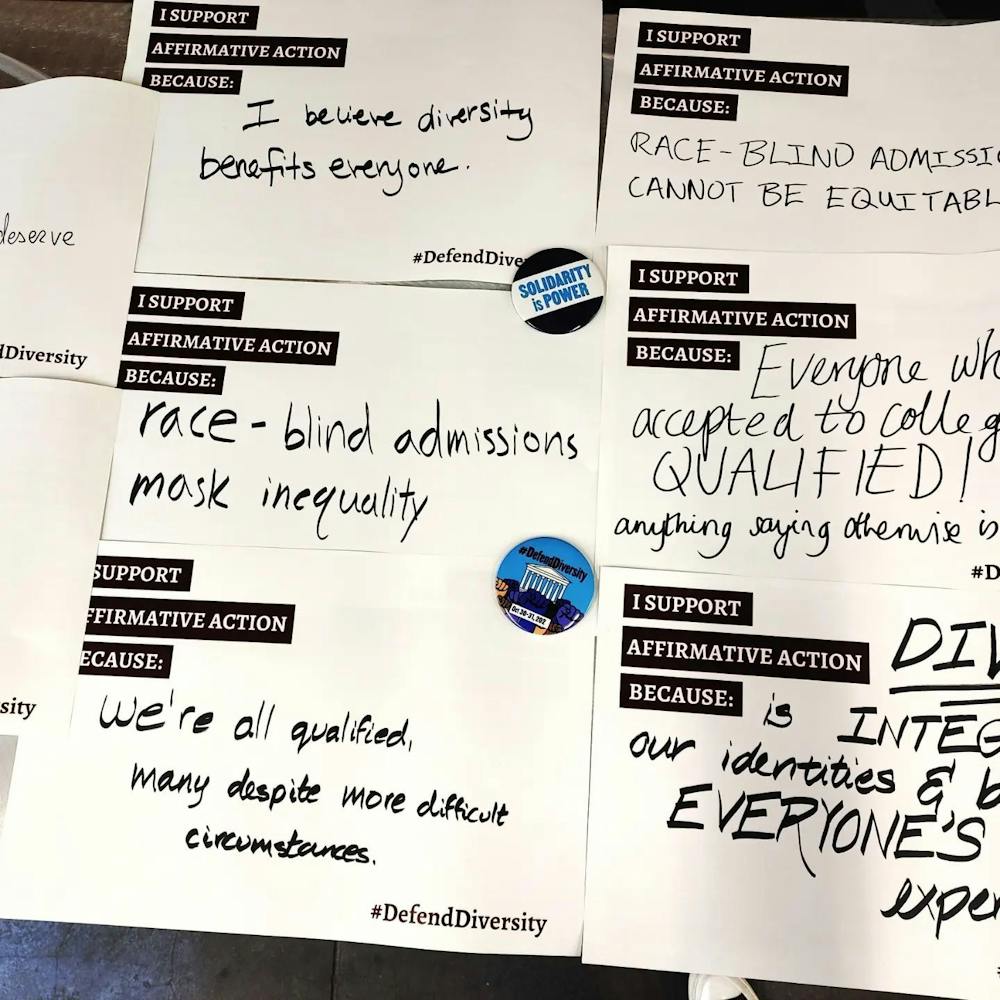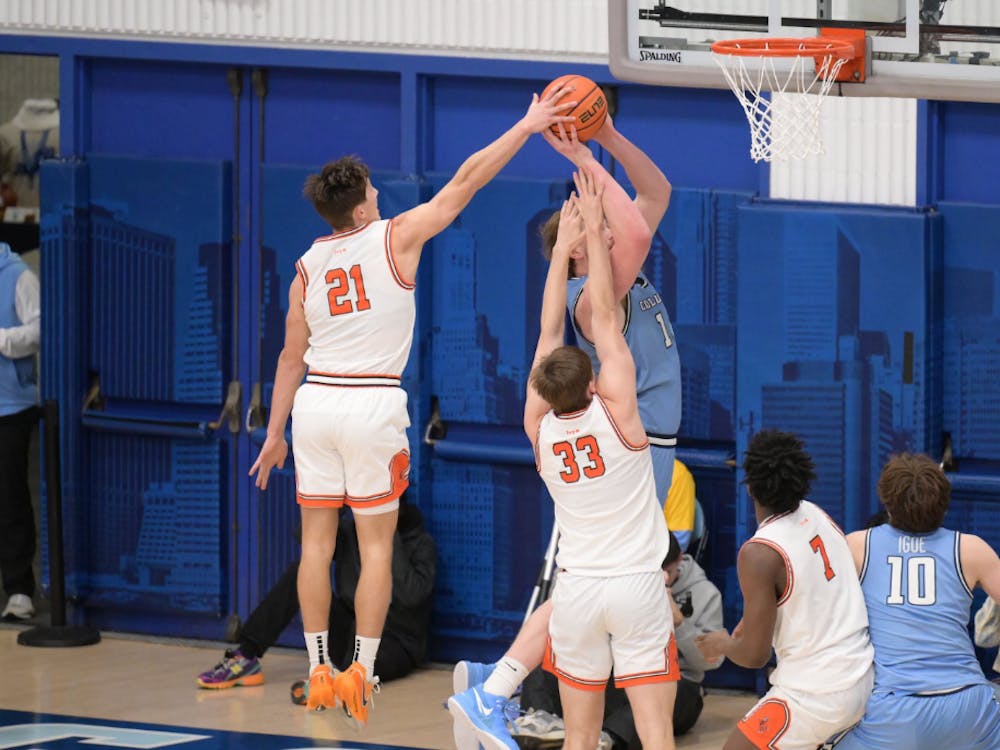On Oct. 31, the Supreme Court heard arguments in two cases that could determine the future of race-based affirmative action in college admissions across the country. After the proceedings, The New York Times reported that “the court’s conservative majority seems ready to throw out affirmative action programs.”
In August, the University signed an amicus brief that stressed the “irreplaceable value” of diversity among the student body. The brief, signed by 13 other institutions including all other Ivy League universities, asked the Supreme Court to uphold Grutter v. Bollinger, a 2003 case, which allowed race and ethnicity to be considered in college admissions so long as other holistic factors are taken into account.
The lawsuits currently before the Court, brought by Students for Fair Admissions (SFFA), allege that the current use of race and ethnicity in admissions decisions at Harvard and the University of North Carolina at Chapel Hill (UNC) is discriminatory.
Princeton’s Asian American Students Association (AASA) was among a coalition of groups on campus that circulated a petition in support of affirmative action in the lead-up to the hearings, including tabling in Frist Campus Center. The petition has been signed by a number of student affinity groups on campus, including the Latin American Student Association, Taiwanese American Students Association, and South Asian Students Association.
“It’s important that students voice their position on this matter because if we don’t say anything, that’s essentially just letting what the Supreme Court rules stand in for what we believe,” Hannah Lee ’24, one of the organizers of the petition, told The Daily Princetonian. “This is an issue of racial equity and justice.”
Lee said AASA had planned on attending protests in front of the Supreme Court on Monday, but was denied funding from the Office of the Dean of Undergraduate Students (ODUS), as well as other sources.
Massive student delegations from other universities, including Harvard and Yale, protested this week in Washington, D.C.
“Student activists on the ground have been working tirelessly to have our voices heard, but this advocacy should be duly amplified by support from staff, faculty, and administrators,” co-organizer Jennifer Lee ’23 wrote to the ‘Prince.’

University Spokesperson Michael Hotchkiss told the ‘Prince’ in an email, “ODUS worked closely with AASA on plans for an alternative, on-campus protest that, unfortunately, did not come to fruition. ODUS will continue to provide support to AASA, as it does for all ODUS-registered student organizations.”
Hannah Lee also expressed that there was more to be done. “As students who are invested in equity and education, there will be more efforts on this issue. This isn’t just a one-off project,” she said.
In an interview with the ‘Prince,’ Udi Ofer, a visiting professor at the School of International and Public Affairs (SPIA) and former Deputy National Political Director of the American Civil Liberties Union, called affirmative action “one of the most effective tools for redressing the injustices caused by our nation’s history of discrimination against people of color.”

As of the 2021–22 academic year, 10 percent of Princeton undergraduates were Black and 12 percent were Hispanic. (Categories as listed in the above graph use the language used by the University.)
When the public university systems in California and Texas eliminated affirmative action in the 1990s, researchers found that the admission rates of Black and Hispanic students fell by as much as 50 percent.
“I don’t think there’s a way to sugarcoat it. This will have a significant impact on what student bodies across the country will look like, which will then have significant impact on what other institutions across America are going to look like,” Ofer told the ‘Prince.’
During oral arguments, U.S. Solicitor General Elizabeth Prelogar emphasized the value of diversity in the setting of higher education. “When students of all races and backgrounds come to college and live together and learn together, they become better colleagues, better citizens, and better leaders,” she said.
SFFA’s lawsuit against Harvard alleges that the university discriminates against Asian Americans, a demographic that currently makes up 27 percent of Princeton’s undergraduate student body.
During the hearing, Justice Samuel Alito ’72 framed college admissions as a “zero-sum game,” where granting advantages to one group necessarily disadvantages another.
Another member of the court, Justice Sonia Sotomayor ’76, has called herself a “product of affirmative action,” referring in part to her admission to Princeton as an undergraduate.
A ruling that race-based affirmative action is unlawful would overturn decades of existing precedent, something that the current court has shown a willingness to do, in cases like Dobbs v. Jackson Women’s Health Organization, which overturned Roe v. Wade.
Speaking to the ‘Prince,’ Professor Laura Edwards of the history department said a ruling that would find affirmative action unconstitutional is all but a foregone conclusion.
Conservative judges “have been vetted by the Federalist Society, which has a more libertarian view, where they’re focusing on individuals, not on social connections or the public good,” she said. “We all know where it’s going to end up, which is they're going to overrule.”
Benjamin Woodard ’25 attended the oral arguments in person. “The justices do ask legitimate questions,” he said. “It’s not just them reaffirming their priors, even during the arguments by the counsels for Students for Fair Admissions.”
Looking toward the future, Paul Frymer, a professor of politics, noted that the University and other institutions may be able to “diversify admissions without the affirmative action precedent,” should the Supreme Court rule against race-conscious admissions. During arguments, lawyers for SFFA said that applicants would still be able to write about race or discrimination, even if race itself could not be a specific factor.
Hotchkiss, the University spokesperson, did not respond to specific inquiry from the ‘Prince’ on how the elimination of affirmative action would impact University admissions. But Ramona Romero, Vice President and General Counsel for the University, emphasized Princeton’s role in the amicus brief in an email statement to the ‘Prince.‘
“The amicus brief allowed us to convey to the Supreme Court how central the ability to recruit talent from every segment of society is to our pursuit of excellence, and to reaffirm for our own community how firmly we value inclusivity and diversity in its many dimensions, including racial and ethnic diversity,” she said.
“The ultimate impact of the decision is hard to predict without seeing how the Court frames its opinion,” she added. “I think it’s fair to say that a significant decline in the demographic diversity of our student body would make Princeton far less intellectually rich, interesting, and innovative than it is today.”
Editor’s Note: This article has been updated as of Nov. 10 to include comment from University General Counsel Romano Romero.
Charlie Roth is a Staff News Writer and Assistant Data Editor for the ‘Prince,’ focusing on local town coverage.
Miriam Waldvogel is a News Contributor for the ‘Prince.’
Please send any corrections to corrections@dailyprincetonian.com.








